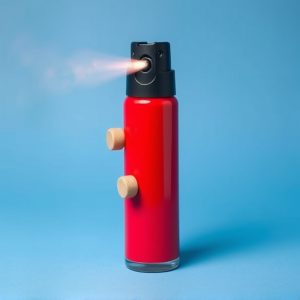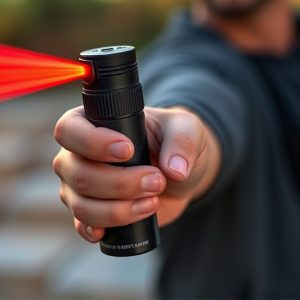Pepper Spray Removal: Soothing Skin After Exposure
While pepper spray offers personal security, it can cause skin irritation. Immediate rinsing with wa…….
While pepper spray offers personal security, it can cause skin irritation. Immediate rinsing with water for 15 minutes dilutes and washes away irritants, followed by gentle soap cleaning. Home remedies like olive oil or baking soda paste soothe mild reactions. Severe cases require medical attention for persistent symptoms and long-term monitoring. Effective Pepper Spray Removal From Skin involves quick action and thorough cleaning to minimize irritation.
Personal security is a vital concern in today’s world, and pepper spray has emerged as a powerful defense mechanism. This article explores the impact of pepper spray on skin, providing practical advice for those who’ve come into contact with it. We’ll guide you through effective removal methods, from immediate steps to natural home remedies. Additionally, we’ll discuss precautions and when medical attention is necessary, ensuring you’re prepared and informed about pepper spray removal from skin.
- Understanding Pepper Spray and Its Impact on Skin
- Step-by-Step Guide to Removing Pepper Spray from Skin
- Effective Home Remedies for Soothing Irritated Skin
- Precautions and When to Seek Medical Help
Understanding Pepper Spray and Its Impact on Skin
Pepper spray, a popular personal security product, is designed to incapacitate an attacker by causing temporary blindness and respiratory distress. However, its impact on skin is an important consideration. When pepper spray comes into contact with skin, it can lead to irritation, redness, and even more severe reactions depending on the concentration and sensitivity of the individual. The active ingredient in pepper spray, capsaicin, disrupts nerve signals, which can cause a burning sensation and inflammation.
Effective Pepper Spray Removal From Skin is crucial for those who have been exposed. It’s recommended to immediately rinse the affected area with plenty of water to dilute the spray and prevent further absorption. This initial step should be followed by gentle cleaning with a mild soap. In cases of prolonged exposure or severe reactions, seeking medical attention is advised. Understanding how pepper spray interacts with skin can help individuals better prepare for and manage such situations.
Step-by-Step Guide to Removing Pepper Spray from Skin
Pepper spray can cause immediate and intense irritation, but there’s a step-by-step process to effectively remove it from your skin. Start by gently rinsing the affected area with warm water for at least 15 minutes. This helps dilute the pepper spray and prevent further absorption into your skin. Next, use a mild soap to create a lather and thoroughly clean the skin, ensuring you wash away any remaining spray residue.
Pat the area dry with a clean towel instead of rubbing, as rubbing can spread the irritants further. If the irritation persists or becomes severe, apply a cold compress for 10-15 minutes at a time to help soothe the skin. Additionally, consider using over-the-counter hydrocortisone cream or an anti-itch lotion recommended by a pharmacist for relief. Always remember, quick action and thorough cleaning are key to minimizing the impact of pepper spray exposure.
Effective Home Remedies for Soothing Irritated Skin
When it comes to soothing irritated skin after exposure to pepper spray, home remedies can be a gentle and effective solution. One popular remedy involves using olive oil as a natural emollient. It helps to break down the irritant and moisturize the affected area, providing relief from itching and redness. Simply apply a small amount of pure olive oil to the skin, gently massaging it in circular motions for several minutes until the skin is calm and comfortable.
Another simple yet effective home remedy is using a mixture of baking soda and water. Creating a paste by combining these ingredients can help neutralize the effects of pepper spray. Apply the paste to the irritated skin, leave it on for about 15-20 minutes, then rinse thoroughly with warm water. This method soothes the skin, reduces inflammation, and helps remove any residual pepper spray particles. Always remember that for more severe reactions or if symptoms persist, seeking medical advice is essential.
Precautions and When to Seek Medical Help
If you’ve come into contact with pepper spray, it’s crucial to take immediate action to remove it from your skin. Start by rinsing the affected area thoroughly with plenty of water for at least 15 minutes. This will help dilute and wash away the irritant. Avoid using soap or any other cleansers during this initial rinse, as they can trap the pepper spray particles closer to your skin.
Seek medical attention if the symptoms persist or worsen. Pepper spray can cause severe discomfort, redness, itching, and difficulty breathing. If you experience persistent coughing, shortness of breath, chest tightness, or vision changes, it’s a sign of a more serious reaction that requires professional treatment. Additionally, consult a doctor if the skin irritation doesn’t subside after thorough rinsing or if blisters form. They can provide further guidance, prescribe medications, and ensure no long-term effects from exposure to pepper spray.
After understanding the effects of pepper spray on skin, mastering removal techniques like those detailed in this article is essential for personal security. Remember that prompt action is key to minimizing irritation and discomfort. While home remedies can provide soothing relief, severe reactions or persistent symptoms warrant medical attention. By being prepared with knowledge and the right tools, individuals can effectively navigate potential security challenges while prioritizing their well-being.


